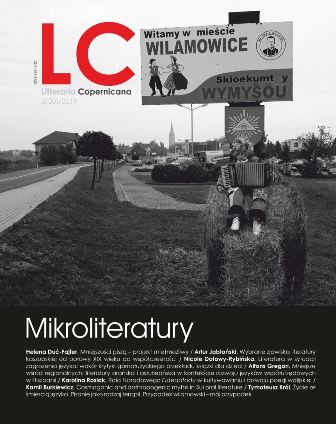Cosmogonic and anthropogenic myths in Sui oral literature
DOI:
https://doi.org/10.12775/LC.2019.028Słowa kluczowe
Sui, oral literature, mythsAbstrakt
This article provides a brief and selective introduction to the Sui oral literature, thematically limited to cosmogonic and anthropogenic myths. An essential description is provided of the Sui living in southernChina, mainly in rural areas of the southwestern region ofGuizhouProvince, their society, numbering 400 thousand people many of whom still preserve indigenous customs and traditions, and their language which, as other members of the Kam-Sui branch of the Tai-Kadai family, possess analytic, isolating and tonal features. The description is followed by an explanation of the most popular motifs of the Sui oral literature, many of which are shared with neighbouring ethnic groups. Separate paragraphs are also dedicated to the genres and structural characteristics of Sui oral literature that have a special social function as the repository of people’s collective memory. The literature is exemplified through fragments of two songs recorded in Li Fanggui’s Studies on the Sui Language (1966), accompanied by English glosses and poetic renderings. The latter constitute the first attempt to translate Sui literature while preserving its syllabic structure and rhymes.
Bibliografia
Burkiewicz, Kamil 2015. The script and language of the Sui in Southern China: description, dictionary, relations with Chinese language and culture. PhD dissertation. Poznań: Adam Mickiewicz University.
Castro, Andy and Pan Xingwen 2014. Shuǐyǔ Diàochá Yánjiū [Studies and research on the Sui language]. Guiyang: Guizhou Minzu Chubanshe.
Cen Jiawu 1943. “Shuǐshū yǔ Shuǐjiā Láiyuán” [The books of Sui and the origin of Sui ethnicity]”. In: Pan Chaolin and Tang Jianrong (eds.) 2009. Shuǐshū Wénhuà Yánjiū [studies on the culture of the books of Sui]. Guiyang: Guizhou Minzu Chubanshe. 11–30.
Fan Yu (ed.) 1987. Shuǐzú Wénxué Shǐ [The history of Sui literature]. Guiyang: Guizhou Minzu Chubanshe.
Frawley, William (ed.) 2003. International encyclopaedia of linguistics (second edition, vol. 4). Oxford: Oxford University Press.
Lai Jingru (ed.) 2012. Shuǐzú Yǔyán Wénběn Cáiliào [Sui language text material]. Guiyang: Guizhou Daxue Xi’nan Shaoshu Minzu Yuyan Wenhua Yanjiusuo.
Lai Jingru 2015. Lǐ Fāngguì《Shuǐhuà Yánjiū》zhī Yǔyánxué Yánjiū [A linguistic study of Li Fanggui’s Sui language text collection]. PhD dissertation. Beijing: Graduate School of Chinese Academy of Social Sciences.
Lewis, Mark Edward 2006. The flood myths of early China. New York: State University of New York Press.
Li Fanggui 1966. Shuǐhuà yánjiū [Studies on the Sui language]. Taibei: Zhongyang Yanjiuyuan Lishi Yuyan Yanjiusuo.
Pan Chaolin, Wei Zonglin 2004. Zhōngguó Shuǐzú Wénhuà Yánjiū [Studies on the culture of the Sui nationality in China]. Guiyang: Guizhou Minzu Chubanshe.
Wei Shuqi 2012. Jìzǔ Jīng [Book of ancestor worshipping]. Master’s dissertation, Guizhou Minzu Uiniversity.
Wei Xuechun 2011. Shuǐyǔ Miáoxiě Yánjiū [A description of the Sui language]. PhD dissertation, Shanghai Normal University.
Yang Jieqin and Wei Guangrong 2010. Shuǐshū: Qílín Zhèng Qī Juǎn (Shàng、Xià Cè) [the books of Sui: “The Volume of the First and Seventh Months of the Qilin” (vol. I, II)]. Guiyang: Guizhou Minzu Chubanshe.
Zeng Xiaoyu 2004. Hànyǔ Shuǐyǔ Guānxì Lùn [Theories on relations between the Chinese and Sui language]. Beijing: Shangwu Yinshuguan.
Zhi, Jia 1990. “Epics in China”. In: Lauri Honko (ed.). Religion, myth, and folklore in the world’s epics. Berlin: Mouton de Gruyter. 503–518.
Zu Dainian and Zhou Longyuan (eds.) 1988. Shuǐzú Mínjiān Gùshì Xuǎn [Sui nationality folk tales]. Shanghai: Shanghai Wenyi Chubanshe.
Pobrania
Opublikowane
Jak cytować
Numer
Dział
Statystyki
Liczba wyświetleń i pobrań: 587
Liczba cytowań: 0



